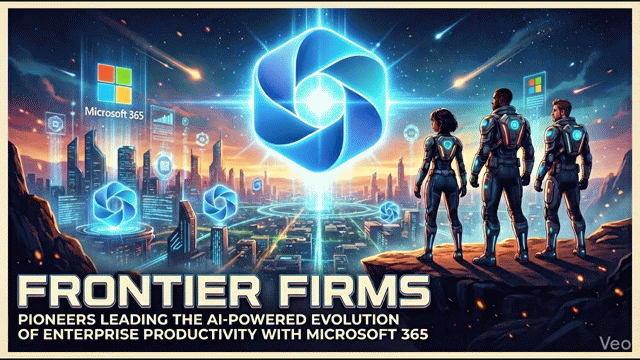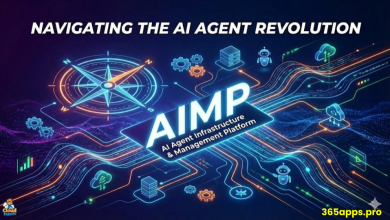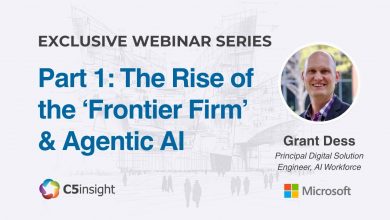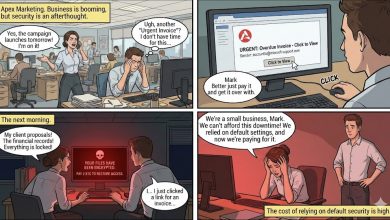The CEO’s Guide to Building a Frontier Firm
In an era where the pace of change is relentless and the demands on organizations are unprecedented, a new archetype of enterprise is emerging: the Frontier Firm.
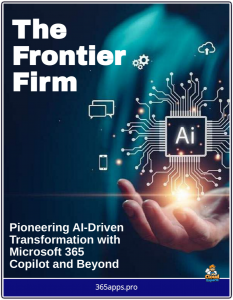 A Frontier Firm represents a radical evolution in organizational structure, where AI agents serve as the primary operational engine, executing most knowledge work autonomously while humans shift to high-value roles focused on vision, strategy, relationship-building, and oversight.
A Frontier Firm represents a radical evolution in organizational structure, where AI agents serve as the primary operational engine, executing most knowledge work autonomously while humans shift to high-value roles focused on vision, strategy, relationship-building, and oversight.
Unlike traditional companies, Frontier Firms treat intelligence as an abundant, on-demand resource—much like electricity—deploying it scalably to drive growth, agility, and innovation.
In Microsoft’s WorkLab article “The CEO’s Guide to Building a Frontier Firm,” the concept of a transformative organization powered by AI is introduced, redefining knowledge work. In this leadership keynote, Jared Spataro, Microsoft’s CMO of AI at Work, explores how AI is reshaping the very fabric of modern organizations.
The Frontier Firm represents a future where AI evolves from a supportive tool to the core of operations, fundamentally reshaping how businesses function. The article outlines a three-phase journey toward this vision.
At the Forefront of Transformation: The Frontier Firm
The article argues that AI is accelerating business transformation at an unprecedented pace, compressing decades of progress into years—much like the leap from steamships to aviation. To thrive, companies must evolve into “Frontier Firms,” where AI agents (autonomous systems) handle most execution, while humans focus on vision, strategy, relationships, and oversight.
The biggest barrier isn’t technology but imagination: reimagining how work is structured. Microsoft shares its sales team’s real-world implementation as proof, showing measurable gains in revenue and efficiency.
This model blends human judgment with machine intelligence, forming hybrid teams that redefine work: agents handle execution, humans orchestrate outcomes. The concept emerged prominently in Microsoft’s 2025 Work Trend Index, positioning 2025 as the “year the Frontier Firm is born,” with 82% of leaders viewing it as a pivotal moment to rethink operations.
Core principles include:
- Human-Led, Agent-Operated: Humans set goals; agents execute and collaborate among themselves.
- Scalable Digital Labor: Agents enable expansion into untapped markets without proportional hiring.
- Dynamic Structures: Traditional org charts give way to “Work Charts”—fluid, goal-oriented teams.
- Abundant Intelligence: AI compounds value over time, turning routine tasks into strategic advantages.
The barrier to adoption isn’t technology but imagination: re-envisioning work to leverage AI’s full potential.
The Three Phases of AI Transformation
Progress toward a Frontier Firm occurs in non-linear phases, often creating a “jagged frontier” where teams operate at different stages simultaneously. These phases build from individual augmentation to full organizational reinvention.
Phase 1: AI as Personal Assistant (Human with Assistant)
AI boosts individual productivity by automating routine tasks like note-taking, data analysis, or content creation. Humans remain the drivers, but efficiency gains compound across the workforce.
In sales, Microsoft 365 Copilot handles CRM updates and meeting summaries, freeing sellers for customer interactions. Early 2024 data showed users achieving 9.4% higher revenue per person and 20% more deals closed. By 2025, 24% of leaders report org-wide deployment, with 80% of workers citing AI’s 24/7 availability as a key draw.
Phase 2: AI as Team Member (Human-Led Agents)
Agents act as digital colleagues, performing directed tasks like triaging tickets or providing real-time insights, enhancing team collaboration without constant human intervention.
Sales Chat integrates CRM data for on-demand coaching and predictions, such as pre-meeting briefs, reducing tool-switching. In 2025, 46% of leaders use agents for full workflow automation, with 81% planning extensive integration.
Phase 3: Human-Led, Agent-Operated
Agents manage entire processes autonomously, escalating only for human judgment. New roles like “agent managers” emerge to oversee digital teams. This phase unlocks “AI territories”—vast markets serviced by agents alone.
The Sales Agent prospected 36,000 leads in Q1 2025, converting 10.4% into opportunities in underserved SMB segments, mimicking junior reps but at scale. Agents now include specialized ones like Researcher for multi-step analysis or Facilitator for meeting orchestration.
Key Strategies for Building a Frontier Firm
CEOs should experiment incrementally: start with low-risk pilots, measure outcomes, and scale boldly while building trust through safeguards. Strategies include:
- Refocus Talent: Shift from execution to orchestration; upskill for AI roles (e.g., 78% of leaders plan AI-specific hires).
- Unlock Growth: Use agents for cost reduction and new revenue, targeting AI territories for margin expansion.
- Govern Responsibly: Implement policies for data hygiene, security, and ethical AI, treating agents like employees with lifecycles and reviews.
- Foster Adoption: Leverage peer communities, gamified training, and metrics like the AI Value Framework to track revenue, efficiency, and employee experience.
AI at Work: How Human-agent Teams Will Reshape Your Workforce
In a companion guide the team explores the evolution of work through human-AI agent collaboration, outlining three stages of AI integration in the workplace.
In the first stage, AI tools like Microsoft 365 Copilot act as personal assistants, enhancing individual productivity in tasks such as writing, data analysis, and coding. The second stage involves human-agent teams, where AI agents handle complex, specialized tasks, working alongside humans to streamline workflows, as seen in Microsoft’s sales teams using tools like Sales Chat.
The third stage envisions a fully integrated “Frontier Firm,” where AI agents perform most operational tasks, allowing humans to focus on strategic, creative, and relationship-driven roles.
However, challenges include ensuring trust in AI outputs, addressing data privacy, and upskilling employees to manage AI agents effectively. The article emphasizes a phased approach—starting with low-risk pilots, verifying results, and scaling successful implementations. Leaders must foster a culture of experimentation and adaptability to navigate this “jagged frontier” of progress.
Human-agent collaboration promises to amplify human potential, freeing workers from repetitive tasks to focus on innovation and decision-making. To succeed, organizations must align AI adoption with business goals, integrate agents thoughtfully, and maintain human oversight for ethical and accurate outcomes.
The critical insights are that embracing human-agent teams is essential for staying competitive, urging leaders to act now to shape a future where AI augments human ingenuity.
Copilot
This is not merely a business that adapts to technological advancements but one that redefines its very essence through the seamless integration of human ingenuity and artificial intelligence. At the heart of this transformation lies Microsoft 365 Copilot, a groundbreaking tool that transcends traditional productivity software to become a catalyst for human–agent collaboration, intelligent automation, and on-demand decision-making.
The Frontier Firm is defined by its ability to operate at the edge of possibility, where decisions are not just data-driven but intuitively informed, where processes are not just efficient but dynamically adaptive, and where employees are not just task-doers but empowered innovators.
Microsoft 365 Copilot enables this vision by embedding AI deeply into the workflows, communications, and creative processes that drive modern organizations. It is not a tool that replaces humans but one that amplifies their potential, enabling them to focus on what truly matters: strategy, creativity, and meaningful connection.
Frontier Firms leverage Copilot’s capabilities to foster collaboration between humans and AI, automate intelligently to eliminate inefficiencies, and make decisions with unprecedented speed and precision. From reimagining knowledge work to unlocking new models of innovation, this is a guide to building the organizations of tomorrow—today.
The Path Forward
Microsoft 365 Copilot is more than a productivity tool; it’s a cornerstone of the Frontier Firm, enabling a new paradigm of work where humans and AI collaborate seamlessly. By amplifying human potential, streamlining workflows, and enabling real-time decision-making, Copilot empowers organizations to operate with unprecedented agility and innovation. As Frontier Firms embrace this model, they redefine what it means to work, compete, and thrive in a rapidly evolving world.
This exploration only scratches the surface of human-agent collaboration. The Frontier Firm’s journey is just beginning, and Microsoft 365 Copilot is the guide, unlocking possibilities that were once unimaginable.
